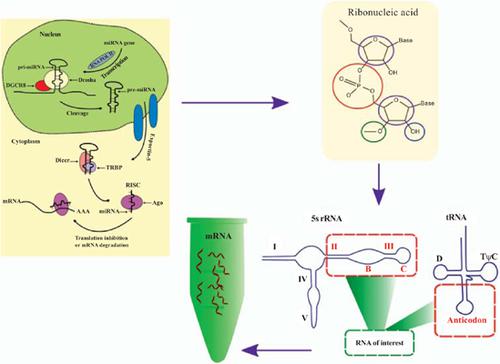Current Pharmaceutical Biotechnology ( IF 2.2 ) Pub Date : 2020-09-30 , DOI: 10.2174/1389201021666200420101613 Atieh Hashemi 1 , Gilar Gorji-Bahri 1

|
MicroRNAs (miRNA) are small non-coding RNAs that act as one of the main regulators of gene expression. They are involved in maintaining a proper balance of diverse processes, including differentiation, proliferation, and cell death in normal cells. Cancer biology can also be affected by these molecules by modulating the expression of oncogenes or tumor suppressor genes. Thus, miRNA based anticancer therapy is currently being developed either alone or in combination with chemotherapy agents used in cancer management, aiming at promoting tumor regression and increasing cure rate. Access to large quantities of RNA agents can facilitate RNA research and development. In addition to currently used in vitro methods, fermentation-based approaches have recently been developed, which can cost‐effectively produce biological RNA agents with proper folding needed for the development of RNA-based therapeutics. Nevertheless, a major challenge in translating preclinical studies to clinical for miRNA-based cancer therapy is the efficient delivery of these agents to target cells. Targeting miRNAs/anti-miRNAs using antibodies and/or peptides can minimize cellular and systemic toxicity. Here, we provide a brief review of miRNA in the following aspects: biogenesis and mechanism of action of miRNAs, the role of miRNAs in cancer as tumor suppressors or oncogenes, the potential of using miRNAs as novel and promising therapeutics, miRNA-mediated chemo-sensitization, and currently utilized methods for the in vitro and in vivo production of RNA agents. Finally, an update on the viral and non-viral delivery systems is addressed.
中文翻译:

MicroRNA:在癌症治疗中的有前途的作用。
微小RNA(miRNA)是小的非编码RNA,可作为基因表达的主要调节因子之一。它们参与维持各种过程的适当平衡,包括正常细胞的分化,增殖和细胞死亡。这些分子还可以通过调节癌基因或抑癌基因的表达来影响癌症生物学。因此,目前正在单独开发基于miRNA的抗癌疗法,或者与癌症治疗中使用的化学治疗剂联合开发,旨在促进肿瘤消退并提高治愈率。获取大量RNA试剂可以促进RNA的研究和开发。除了目前使用的体外方法外,最近还开发了基于发酵的方法,它可以经济高效地生产具有适当折叠性的生物RNA试剂,从而可以开发基于RNA的疗法。尽管如此,将基于miRNA的癌症治疗的临床前研究转化为临床的主要挑战是将这些药物有效地递送至靶细胞。使用抗体和/或肽靶向miRNA /抗miRNA可使细胞和全身毒性降至最低。在这里,我们将从以下几个方面对miRNA进行简要综述:miRNA的生物发生和作用机制,miRNA在癌症中作为抑癌剂或癌基因的作用,将miRNA用作新型和有前景的疗法的潜力,miRNA介导的化学治疗,敏化和目前用于体外和体内产生RNA试剂的方法。最后,解决了病毒和非病毒递送系统的更新。将基于miRNA的癌症治疗的临床前研究转化为临床的主要挑战是将这些药物有效递送至靶细胞。使用抗体和/或肽靶向miRNA /抗miRNA可使细胞和全身毒性降至最低。在这里,我们将从以下几个方面对miRNA进行简要综述:miRNA的生物发生和作用机制,miRNA在癌症中作为抑癌剂或癌基因的作用,将miRNA用作新型和有前景的疗法的潜力,miRNA介导的化学治疗,敏化和目前用于体外和体内产生RNA试剂的方法。最后,解决了病毒和非病毒递送系统的更新。将基于miRNA的癌症治疗的临床前研究转化为临床的主要挑战是将这些药物有效地递送至靶细胞。使用抗体和/或肽靶向miRNA /抗miRNA可使细胞和全身毒性降至最低。在这里,我们将从以下几个方面对miRNA进行简要综述:miRNA的生物发生和作用机制,miRNA在癌症中作为抑癌剂或癌基因的作用,将miRNA用作新型和有前景的疗法的潜力,miRNA介导的化学治疗,敏化和目前用于体外和体内产生RNA试剂的方法。最后,解决了病毒和非病毒递送系统的更新。使用抗体和/或肽靶向miRNA /抗miRNA可使细胞和全身毒性降至最低。在这里,我们将从以下几个方面对miRNA进行简要综述:miRNA的生物发生和作用机制,miRNA在癌症中作为抑癌剂或癌基因的作用,将miRNA用作新型和有前景的疗法的潜力,miRNA介导的化学治疗,敏化和目前用于体外和体内产生RNA试剂的方法。最后,解决了病毒和非病毒递送系统的更新。使用抗体和/或肽靶向miRNA /抗miRNA可使细胞和全身毒性降至最低。在这里,我们将从以下几个方面对miRNA进行简要综述:miRNA的生物发生和作用机制,miRNA在癌症中作为抑癌剂或癌基因的作用,将miRNA用作新型和有前景的疗法的潜力,miRNA介导的化学治疗,敏化和目前用于体外和体内产生RNA试剂的方法。最后,解决了病毒和非病毒递送系统的更新。将miRNA用作新型和有前景的治疗方法的潜力,miRNA介导的化学致敏作用,以及当前用于体外和体内生产RNA试剂的方法。最后,解决了病毒和非病毒递送系统的更新。将miRNA用作新型和有前景的治疗方法的潜力,miRNA介导的化学致敏作用,以及当前用于体外和体内生产RNA试剂的方法。最后,解决了病毒和非病毒递送系统的更新。









































 京公网安备 11010802027423号
京公网安备 11010802027423号